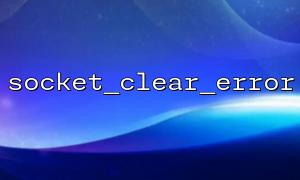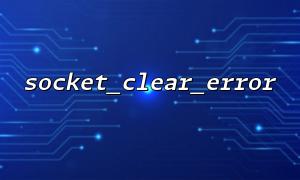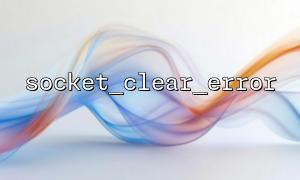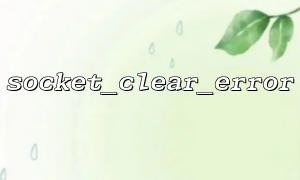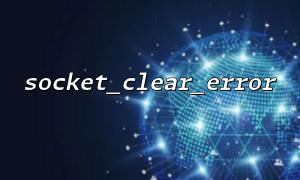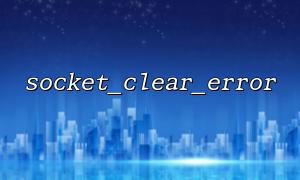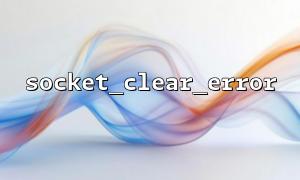When developing real-time communication or long-connect services using the Laravel framework, many developers choose to encapsulate PHP-based Socket services. Socket programming involves the underlying details of network communication, and often encounters problems such as connection errors and data transmission exceptions. PHP natively provides a rich socket operation function, where socket_clear_error() is an important function for cleaning up socket error status. This article will explain in detail how to use it correctly when Laravel encapsulates a Socket service.
socket_clear_error() is a function provided in the PHP Socket extension to clear the error status of the current socket handle. The prototype is as follows:
bool socket_clear_error ( resource $socket )
The parameter $socket is a socket resource.
The return value is Boolean, and the return true if it is successfully cleared, otherwise it will return false .
In some cases, error codes will appear during socket connection or data transfer, and these errors will be saved internally. If not cleaned up, it may affect the accuracy of subsequent operations and the stability of the program.
Laravel itself does not have built-in support for sockets, but through PHP native socket functions, high-performance TCP/UDP services can be implemented, such as chat servers, push servers, etc.
Typically, the steps to encapsulate a Socket service include:
Create a socket
Bind address and port
Listen to connection requests
Accept client connections
Read and write data
Close the connection
In these processes, unstable network environment or abnormal client disconnection can lead to socket errors. In order to avoid program exceptions due to failure to clean up in time, socket_clear_error() becomes very critical.
After each socket operation, you should check whether there are any errors. If an error is detected, you can call socket_clear_error() to clean it up to avoid the error state affecting subsequent operations.
Sample code:
$socket = socket_create(AF_INET, SOCK_STREAM, SOL_TCP);
if ($socket === false) {
echo "createsocketfail: " . socket_strerror(socket_last_error()) . "\n";
socket_clear_error($socket);
exit;
}
$result = socket_bind($socket, '0.0.0.0', 12345);
if ($result === false) {
echo "绑定端口fail: " . socket_strerror(socket_last_error($socket)) . "\n";
socket_clear_error($socket);
exit;
}
Laravel supports exception mechanism, it is recommended to combine socket errors and exceptions to handle, and call socket_clear_error() when catching exceptions to keep the socket state clean.
try {
$socket = socket_create(AF_INET, SOCK_STREAM, SOL_TCP);
if ($socket === false) {
throw new Exception(socket_strerror(socket_last_error()));
}
if (!socket_bind($socket, '0.0.0.0', 12345)) {
throw new Exception(socket_strerror(socket_last_error($socket)));
}
socket_listen($socket);
// Accept client connections
$client = socket_accept($socket);
if ($client === false) {
throw new Exception(socket_strerror(socket_last_error($socket)));
}
// Read data
$buf = socket_read($client, 2048);
if ($buf === false) {
throw new Exception(socket_strerror(socket_last_error($client)));
}
// Processing data...
} catch (Exception $e) {
// Clear socket mistake,Avoid affecting subsequent requests
if (isset($socket)) {
socket_clear_error($socket);
}
if (isset($client)) {
socket_clear_error($client);
}
// Logging or other processing
Log::error('Socket服务mistake: ' . $e->getMessage());
}
If the Socket service is based on a loop listening request, it is recommended to call socket_clear_error() at the beginning or end of each loop to ensure that each processing starts from a clean state.
while (true) {
socket_clear_error($socket);
$client = socket_accept($socket);
if ($client === false) {
continue; // Continue waiting for the connection
}
// Handle client logic
}
Here is a simple example that demonstrates how to encapsulate sockets in the Laravel Service class and use them in conjunction with socket_clear_error() .
namespace App\Services;
class SocketService
{
protected $socket;
public function startServer(string $host = '0.0.0.0', int $port = 12345)
{
$this->socket = socket_create(AF_INET, SOCK_STREAM, SOL_TCP);
if ($this->socket === false) {
throw new \Exception(socket_strerror(socket_last_error()));
}
if (!socket_bind($this->socket, $host, $port)) {
socket_clear_error($this->socket);
throw new \Exception(socket_strerror(socket_last_error($this->socket)));
}
socket_listen($this->socket);
while (true) {
socket_clear_error($this->socket);
$client = socket_accept($this->socket);
if ($client === false) {
continue;
}
$data = socket_read($client, 1024);
if ($data === false) {
socket_clear_error($client);
socket_close($client);
continue;
}
// Processing data逻辑...
socket_close($client);
}
}
public function __destruct()
{
if ($this->socket) {
socket_close($this->socket);
}
}
}
socket_clear_error() is a key function to clean up socket error status.
When encapsulating socket services in Laravel, it is recommended to check for errors and clean up after each socket operation.
This function is called in time during exception handling to ensure the stable operation of the service.
Regularly clean up errors in the circular service to prevent error accumulation.
The rational use of socket_clear_error() can make PHP-based socket services more stable and reliable in Laravel environment.


